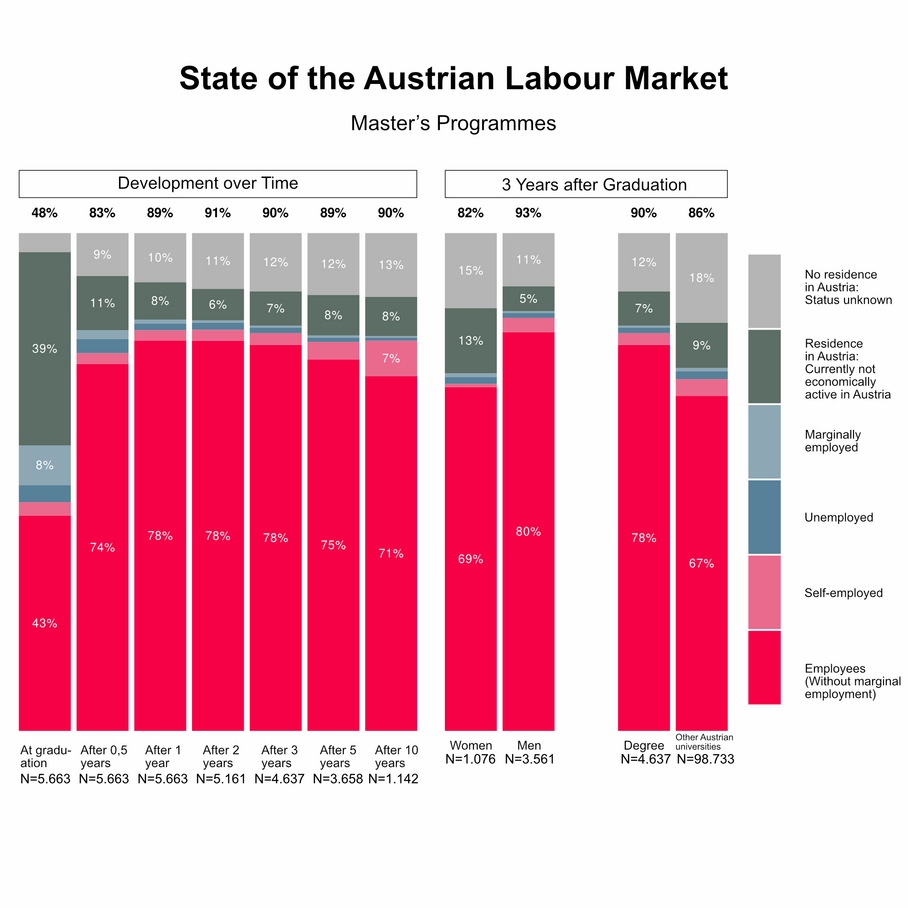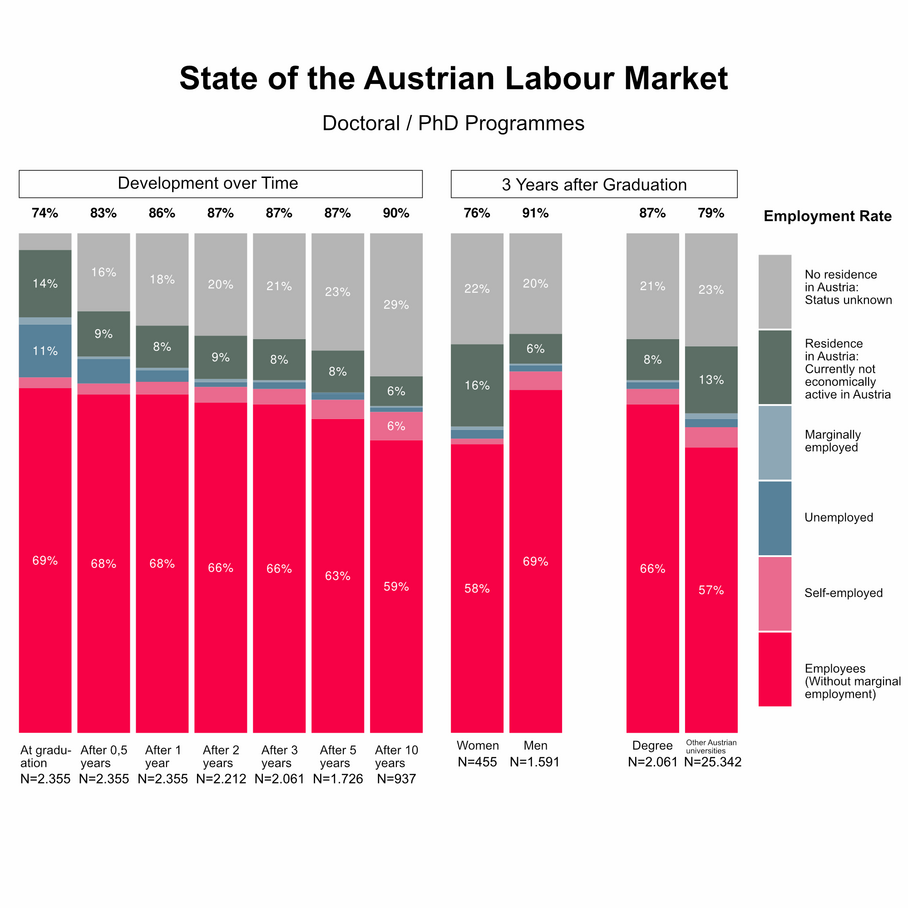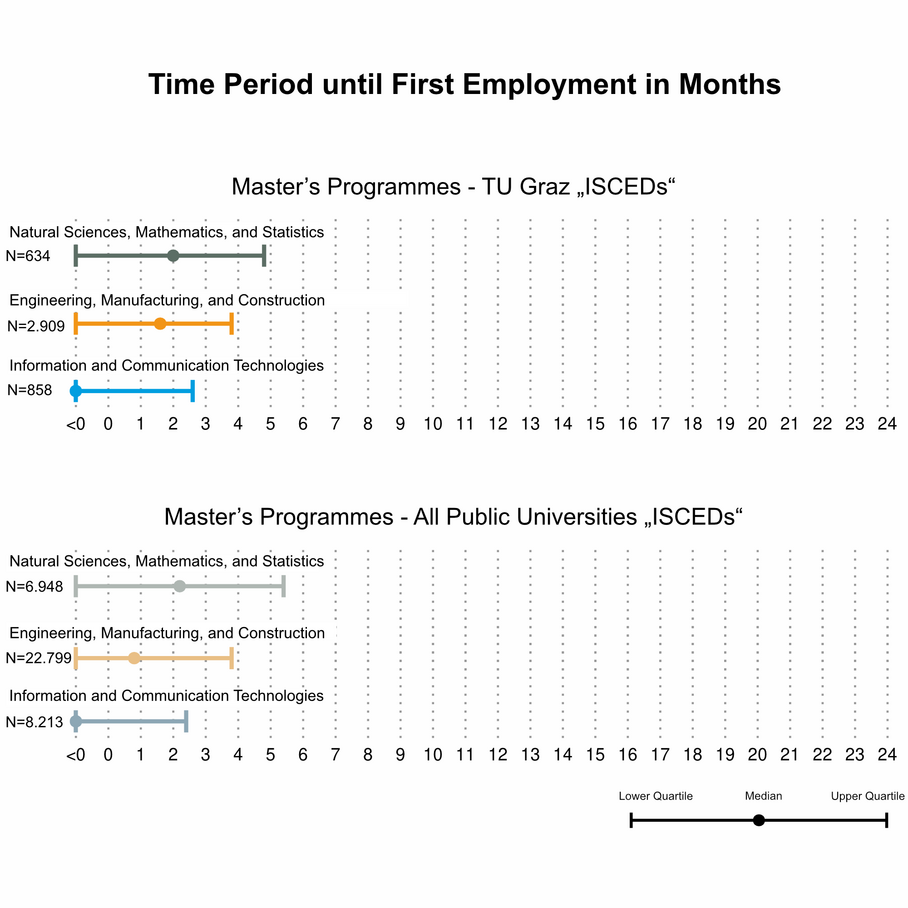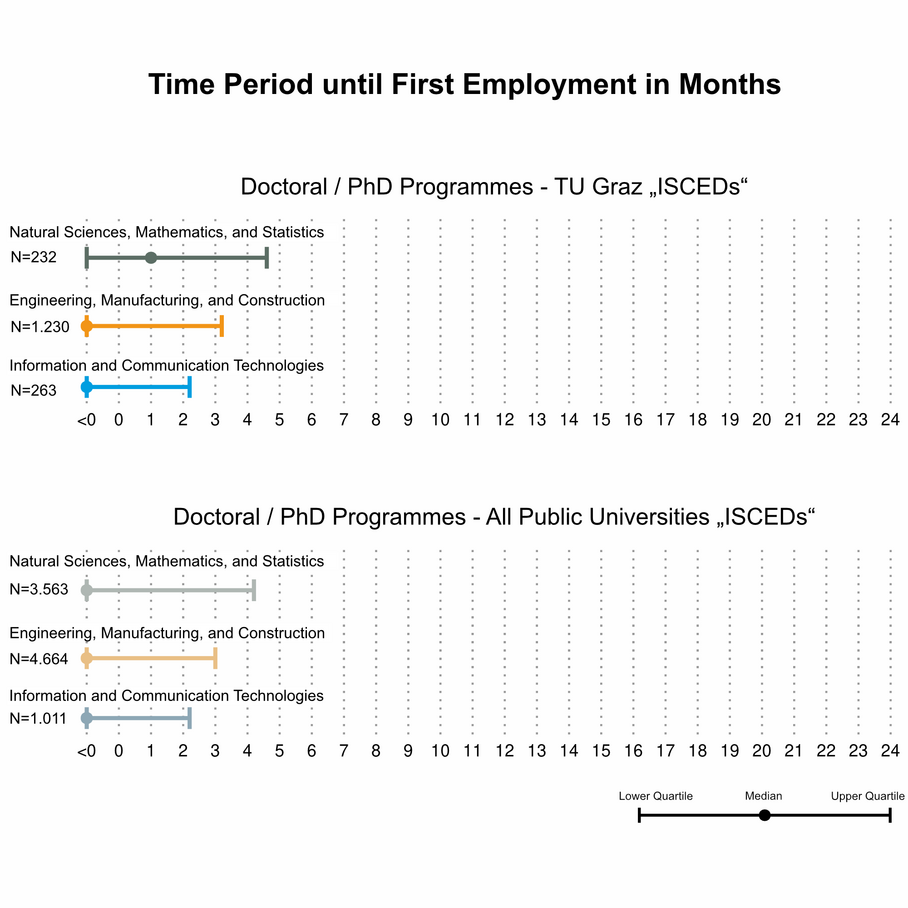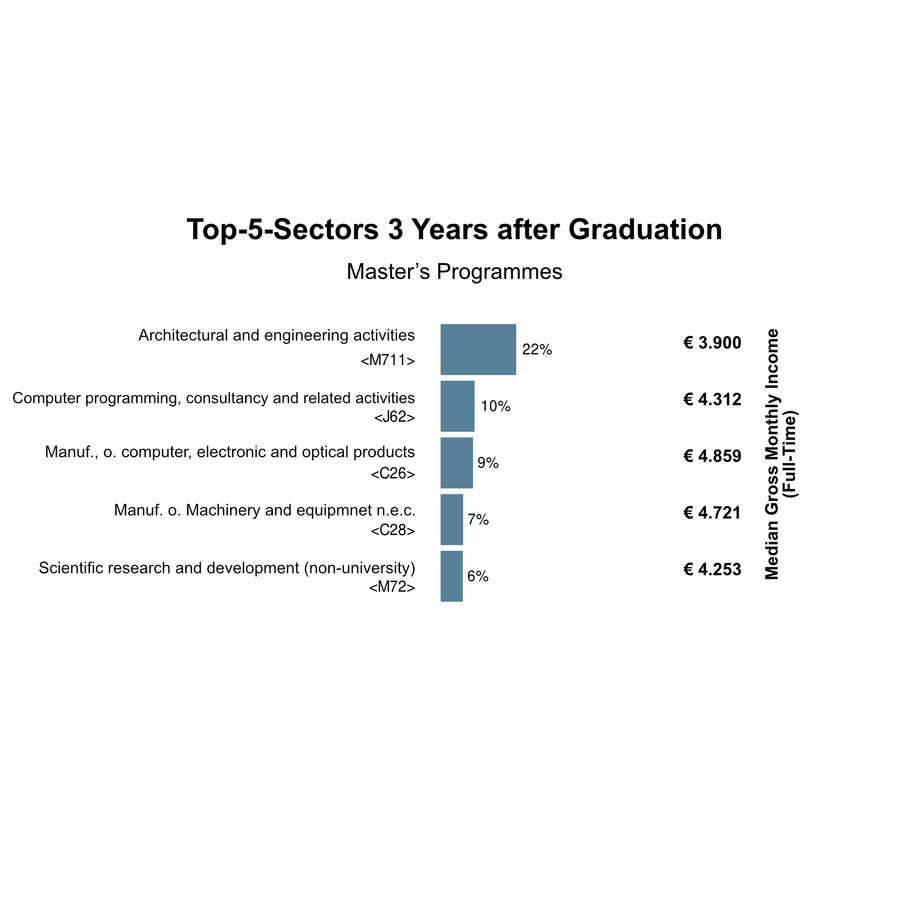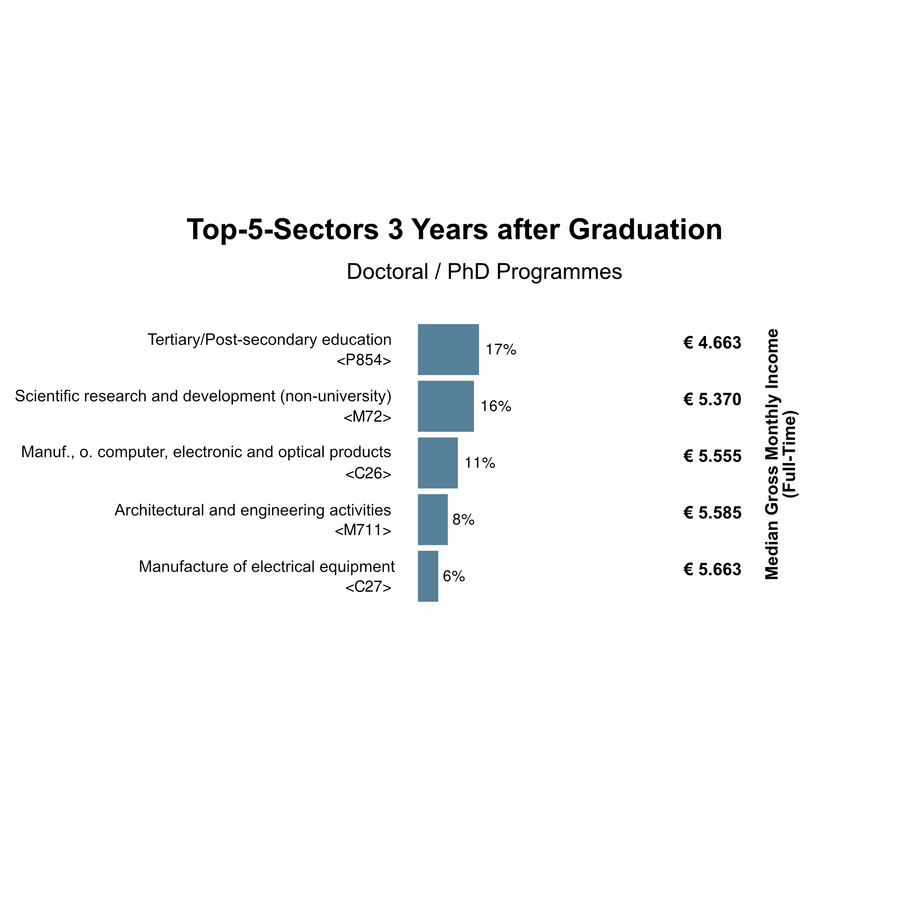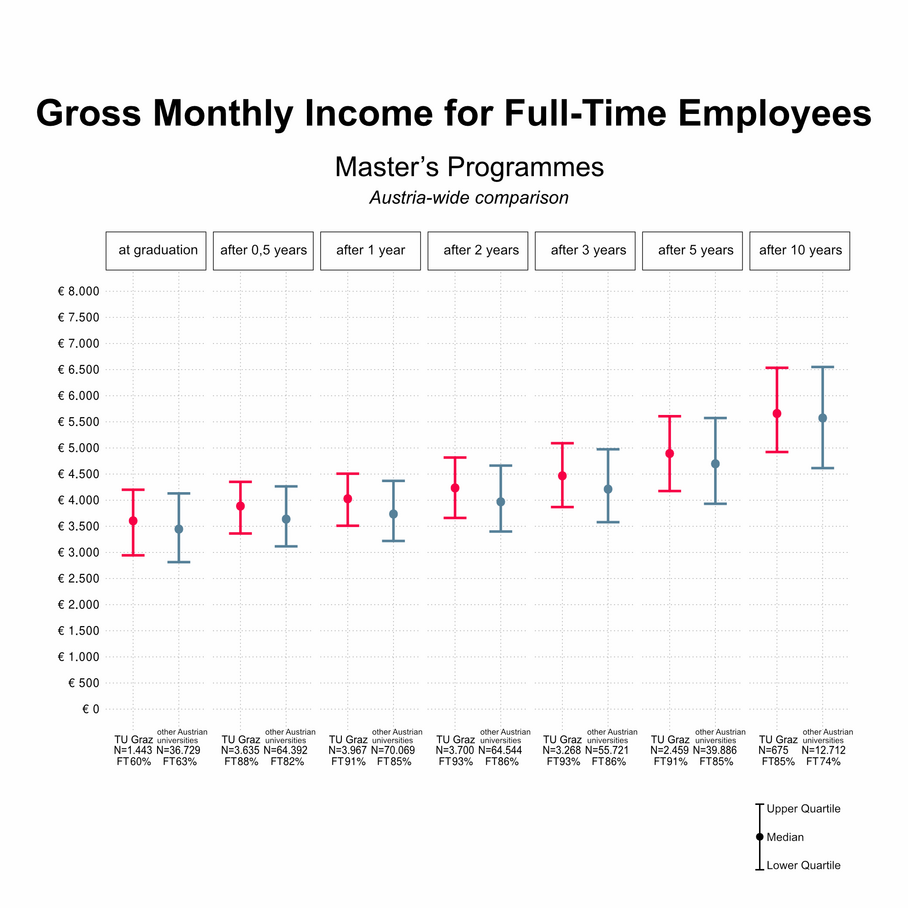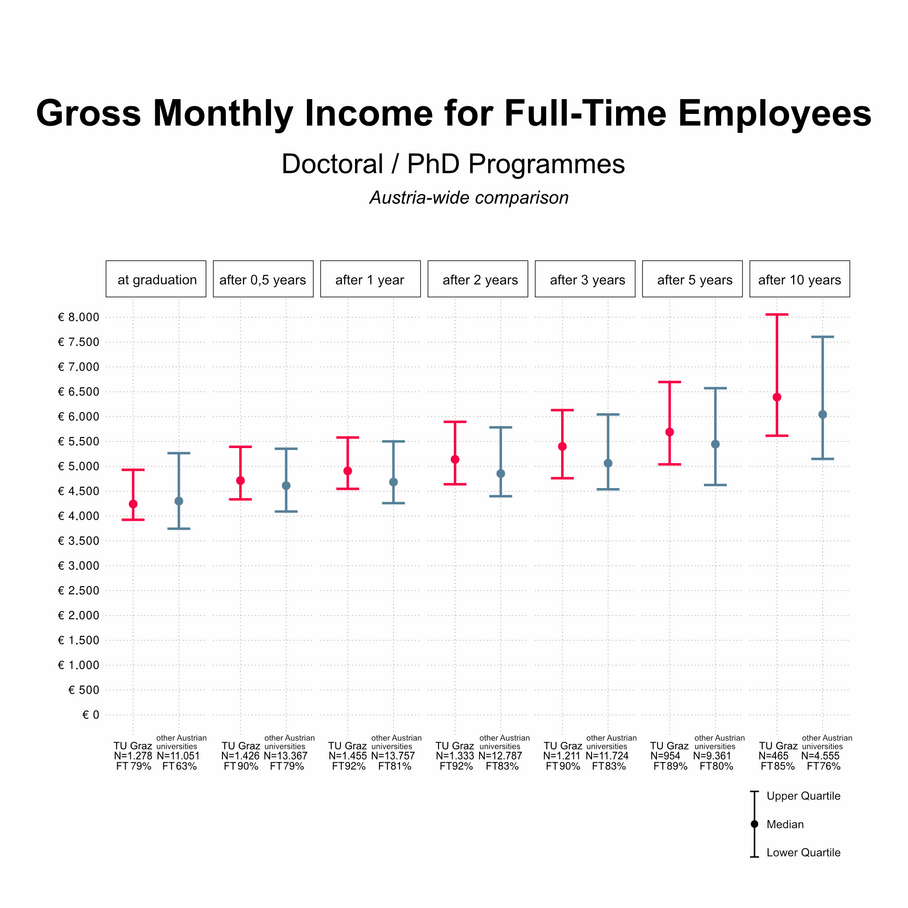
About ATRACK
The graduate tracking project ATRACK (in German: Absolvent*innentracking) was originally funded by the Ministry of Education, Science and Research with structural funding allocated to the higher education area. This project was carried out in cooperation with thirteen Austrian universities and Statistics Austria between 2017 and 2018. Since 2022, it is being developed further by a consortium of 35 Austrian universities in cooperation with Statistik Austria.
In this project, career entry points and employment histories of TU Graz graduates are analysed on the basis of register data, social security data, and data on labour market integration, career histories, and income data are processed.
The population examined consists of all graduates from the academic years of 2008/09 to 2022/23 (as of April 2025). Since most students who graduate with a bachelor's degree from TU Graz go on to pursue a master's degree, the results are mainly presented at the master's and doctorate/PhD level.
The study classification was performed with reference to the ISCED Fields of Education and Training.
Further information about the database as well as explanations and definitions can be found in the notes on the results.
Source: STATISTIK AUSTRIA (2025), Graduate tracking
Contact us
Volker LANG
Mag. rer. nat., BA MA
Quality Management, Evaluation & Reporting
Tel.: +43 316 873 4583
qm@tugraz.at
Labour Market Integration I
Development of labour market status after graduation
The employment rate of TU Graz graduates is relatively high as compared to the overall employment rate in Austria. The following diagrams show how the labour market status had developed by certain key dates after graduation.
Unemployment among TU Graz graduates is overall extremely low. Only 3,5% of graduates with a master's degree are unemployed at the time of graduation. By 3 years after graduation, the share of unemployed graduates has dropped to only 1%. At just under 1%, this share is also very low (36 months after graduation) among doctorate/PhD graduates.
Master’s degree graduates
At 83% six months after graduation, the employment rate of master's degree graduates is already relatively high. By 36 months after graduation, the share of employed persons has risen to 91% and, thus, is also higher than the overall Austrian employment rate (90%). On this key date, a total of 78% of TU Graz master's degrees graduates are employed, just under 3% are self-employed, and about 0.4% are marginally employed.
Doctoral degree graduates
Among graduates with a doctorate/PhD, the employment rate is consistently very high over the entire period, whereby the share of employed persons is observed to decrease slightly after graduation (at graduation: 69%; 3 years after graduation: 66%), and the share of graduates without Austrian residence is observed to increase from approx. 3% at the time of graduation to 21% by 3 years after graduation.
Nevertheless, the high employment rate of 87% (excluding persons without their primary residence in Austria) shows the positive situation for doctorate/PhD graduates on the Austrian labour market. The observed decline in the number of gainfully employed persons, therefore, should not be interpreted as an indication that graduates leave gainful employment, but rather that they establish their primary residence abroad. This trend can also be observed when comparing these data with those from other Austrian universities.
Labour Market Integration II
Time period until first gainful employment
- On average, master's degree graduates are employed one to two months after graduation.
- Doctoral degree graduates often already have a job by the time they graduate.
By field of study:
- Graduates of computer science and communications technology programmes, both master’s and doctorate / PhD level, tend to enter the workforce before graduating.
- Graduates of engineering programmes are able to enter the workforce before graduating (doctorate/PhD) or one to two months after graduation (master's degree).
- Graduates of the natural sciences programmes find a job slightly more than two months (master's degree) or slightly more than one month (doctorate/PhD) after graduation.
Labour Market Integration III
Top 5 sectors three years after graduation
The following diagrams show the top 5 sectors (based on ÖNACE 2008) in which TU Graz graduates are employed three years after graduation, including their median gross monthly income.
- With a master's degree, most graduates were working three years after graduation in architecture and engineering firms (22%) and in IT services (10%).
- Graduates with a doctoral degree were working mainly in tertiary/post-secondary education (17%), in non-university research and development (16%), and in companies that manufacture data processing equipment (11%).
Income
Gross monthly income from full-time employment
- The mean gross monthly income (median) for full-time employment at the time of graduation is 3,600 euros for master's degree graduates and around 4,300 euros for doctorate/PhD graduates.
- By the key date 36 months after graduation, the income of graduates with a master's degree had risen to 4,470 euros and the income of graduates with a doctorate/PhD degree had risen to almost 5,400 euros.
- Overall, the average gross monthly income of TU Graz graduates with a master’s degree is higher than that of other Austrian workers on all reporting dates. This is also the case for Doctoral/PhD graduates after 6 months post-graduation.
Detailed results of individual studies
The currently available detailed results of the graduate tracking project can be downloaded as factsheets.
Master’s Degree Programmes
- Architecture
- Civil Engineering and Structural Engineering
- Civil Engineering – Infrastructure
- Biomedical Engineering
- Biotechnology
- Computer Science
- Electrical Engineering
- Electrical Engineering and Audio Engineering
- Electrical Engineering and Business
- Geodesy
- Geosciences
- Geotechnical and Hydraulic Engineering
- Information and Computer Engineering
- Mechanical Engineering
- Production Science and Management
- Software Engineering and Management
- Technical Chemistry
- Technical Physics
- Chemical and Process Engineering
- Construction Management and Civil Engineering
- Mechanical Engineering and Business Economics
